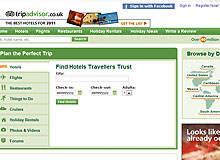
The last 10 years has seen the gradual decline of professional travel writing and hotel reviews. In its place has risen a new, online system of reviews written by real travellers who wish to share their experiences, good and bad, with fellow holidaymakers. For many, these sites have become an invaluable resource, especially as reviewers can post their own pictures to illustrate their points.
TripAdvisor is the largest of these sites, with more than 45 million user reviews posted on more than a million hotels, restaurants and tourist attractions and an average of over 40 million visitors per month. This reach gives TripAdvisor the power to make or break hotels under the weight of popular opinion.
“TripAdvisor is the best place to start your travel planning because it’s like getting advice from a trusted friend who’s been where you want to go,” says TripAdvisor’s UK communications director Emma O’Boyle. “Travellers consider TripAdvisor a critical destination for planning any and all travel, from an overnight in their own city to an around-the-world tour.”
But exactly how trustworthy is TripAdvisor? With no verification system for reviewers, it is an open forum that is potentially open to abuse. Indeed, many visitors to the site are aware that some user reviews are based on unreasonable expectations and a towering sense of entitlement, effectively rendering them useless. More disturbingly, the hospitality industry is increasingly complaining about suspicious reviews that may not be genuine, as well as those that accuse staff of the kind of misbehaviour and criminality that can kill businesses.
Is the industry justified in its allegations of illegitimate reviews and a lack of policing by sites like TripAdvisor, or are these complaints just sour grapes from an industry being forced to up its game in the face of genuine people power? Hotel Management looks at both sides of the argument to find out.
See Also:
The problem with TripAdvisor
With complaints about online review sites, and TripAdvisor in particular, coming from small hotel operators all the way up to hospitality mogul Duncan Bannatyne, what exactly is the core problem that many in the industry have with these sites?
How well do you really know your competitors?
Access the most comprehensive Company Profiles on the market, powered by GlobalData. Save hours of research. Gain competitive edge.

Thank you!
Your download email will arrive shortly
Not ready to buy yet? Download a free sample
We are confident about the unique quality of our Company Profiles. However, we want you to make the most beneficial decision for your business, so we offer a free sample that you can download by submitting the below form
By GlobalDataKwikchex, a UK-based online reputation protection firm, has launched an investigation into online reviews on behalf of its clients in the hospitality industry. For the company’s CEO and co-founder Chris Emmins, the central issue is one of verification. “The core problem with many review sites, not just TripAdvisor, is that the reviews are unverified,” he says. “If you don’t have diligence, you can’t have integrity, and if you don’t have integrity then you can’t really have trust. And that’s the issue we’re looking at.”
According to Kwikchex, the lack of any verification process for reviews leaves sites like TripAdvisor open to misuse, either by rival establishments seeking to damage the reputations of their competitors (or boost their own with fake positive reviews), or by those making defamatory accusations of serious negligence or even criminality, sometimes with financial gain in mind. For Emmins, there is a difference between honest comment (even if it is unreasonable) and a review that seems to have been written with ulterior motives.
“We only take direct action when it involves, frankly, malice,” says Emmins. “That involves things like accusations of criminality; it involves accusations of food poisoning. It’s when we see clear indications that it comes from a competitor, an ex-employee, or if it involves extortion. In other words, examples that would be held up in court as defamation.”
Emmins cites examples such as a reviewer accusing a hotel owner of assault before demanding a large cash payout to take the review down, as well as another reviewer who accused hotel staff of racism, an allegation that was later withdrawn. Other examples include allegations of food poisoning and fraud. “These are the sorts of things that can break a business, simple as that.” Kwikchex believes that at least 27,000 TripAdvisor reviews are legally defamatory.
Investigation by Kwikchex has highlighted some cities and countries that seem to be particularly inundated with fake reviews, like Hanoi, Croatia and Marrakech. “I don’t think you could trust a single thing that is on the Marrakech resource on TripAdvisor,” says Emmins. “I’d go that far; that’s how bad it is.”
Online security and collective wisdom
TripAdvisor says that it has a comprehensive system to weed out and remove suspect reviews. The site employs three primary methods to police user content. Reviews are screened before publication; proprietary security tools automatically flag up dubious reviews; and the site also relies on its community of millions, along with a dedicated quality assurance team, to bring suspicious reviews to light.
“Every review is screened prior to posting and we have proprietary tools in place to help detect fraudulent reviews,” says O’Boyle. “We also periodically confirm the legitimacy of review authors. When a review is suspected to be fraudulent, it is immediately taken down and we have measures to penalise businesses for attempts to game the system. We are extremely concerned about review accuracy, so we cannot compromise our systems by revealing more specifics about how we police for fraud.”
The site also offers resources for hotel owners and management teams to respond to reviews, both positive and negative (although TripAdvisor states that the average rating on the site is a favourable four out of five). The Owners Centre allows businesses to give feedback to reviews and get in touch with TripAdvisor if they think a review is disputable, according to O’Boyle. “This means that owners can publicly respond to all reviews made about their property and it is something we actively encourage all owners to take advantage of – thanking the positive reviews and explaining the negative,” she says. “This effectively gives owners the last word.”
O’Boyle also suggests that the scope and scale of TripAdvisor allows the site to build up a critical mass of reviews to offer a form of collective wisdom, in that TripAdvisor users can examine reviews in bulk to spot trends rather than rely on a single opinion. “We post an average of 21 reviews, opinions and photos every minute and believe that the sheer volume of reviews allows travellers to get the facts, spot trends among reviews and determine whether a property is right for them,” says O’ Boyle. “Our advice to travellers when reading through the reviews of a property is to throw out the anomalies that appear overly critical or overly complimentary. What is left is the collective wisdom of the community.”
The owner’s perspective
For Emmins, TripAdvisor’s assurances are not borne out in reality. He discounts the company’s vision of collective wisdom as “hot air”: “It just doesn’t hold water,” he says. The ones up at the top or down at the bottom could be the honest ones; if they’re saying that they accept that their so-called filtering is really not up to checking these things – because they don’t verify that it’s a genuine customer – and you have to dismiss a percentage, then which ones do you dismiss?”
As for businesses right to reply, Emmins believes that with the most defamatory reviews accusing owners of food poisoning, bedbug infestations or criminal activities, there is no reasonable response other than stating that there is no evidence for such statements. Moreover, Emmins claims that many management responses don’t get published if they attempt to ask questions about legitimacy.
“While anybody can post pretty much anything, the owner is not allowed to be questioning, certainly not critical of either the author or, and this is the big point, of TripAdvisor. The moment there’s any indication of that, they simply don’t publish it – they say it doesn’t meet their guidelines. You either are practising freedom of speech or you’re not,” he says.
Emmins wants to see the company improve security by introducing a verification process that confirms a reviewer’s authenticity as a visitor to the hotel in question, as well as removing out-of-date reviews (some up to nine years old) that provide an opinion that has now become irrelevant and potentially misleading. Until then, Kwikchex will continue to take action on behalf of its clients, against reviewers in cases of defamation and even against TripAdvisor if appropriate.
The very nature of an open, online forum like TripAdvisor makes it both immensely popular with users (a TripAdvisor survey revealed that 97% of users planned to return to the site for their next trip) and inherently difficult to police effectively. Despite TripAdvisor’s statements on its review screening process, it’s clear that a large number of suspect reviews are still getting through and staying online, many of which Kwikchex believes are legally defamatory. While TripAdvisor’s visitors may be happy with the current system, the ramifications for unfairly smeared hotels could be more concerning.






